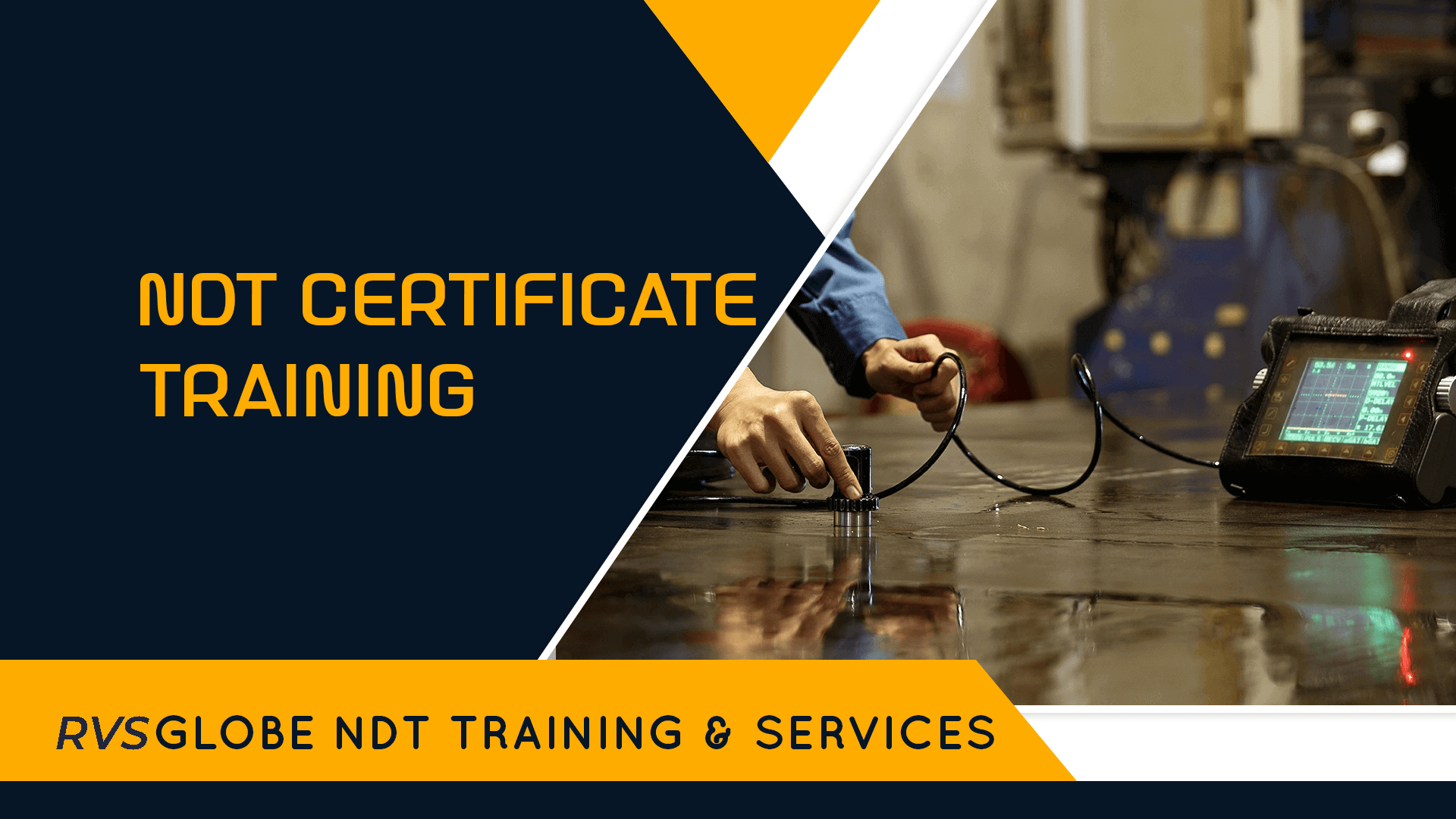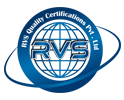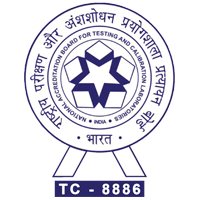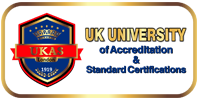Ndt Certificate Training
STUDENT RESULTS RVSGLOBE
Click HereNDT CERTIFICATE TRAINING

WHAT IS NON-DESTRUCTIVE TESTING?
WHAT IS NDT?
Non-Destructive Testing (NDT) is a process of inspecting, testing and evaluating the materials, components and assemblies of the discontinuities or characteristics differences without damaging the serviceability parts or the systems. In other words, ensure the parts or systems are in working capability even after completion of inspection or test of the product.
NDT’s primary objective is to predict or evaluate the performance and assistant life of an element at multiple levels of the manufacture and program life-cycle.
NDT is also used in quality control of the products and different facilities. It is also used for the fitness and evaluation purpose (for the plant life assessment) to judge the remaining plant elements life procedure like processing lines, pipes, and vessels.
NDT inspection for the commercial engineering and equipment structure is most essential in chemical substances, power generation plants, petroleum processing sectors, and transportation sectors. NDT applies State-of-the-innovative art methodology to evaluate the current condition, fitness-for-service, and other lifestyle products.
NDT inspection service provides simple data assisting in strategic development programs for extended vegetation. The huge rise in the necessity of quality-centered Non-Destructive Inspection in various industries is led to building blocks of the business by technical proficiency and experienced persons.
ABOUT RVSGLOBE NDT TRAINING
The immense knowledge gained by us for two years through our journey from various continents in both onshore and offshore products made us flexible to provide the industry-specific inputs as per the market standards.
The intense experience we gained throughout our journey in NDT helped us in shaping our business and expanded our actions from Industrial NDT Training, NDT services, NDT Consultancy, NDT expedition at multiple sites and projects, Orientation and motivational programmes to the NDT personnel in renewed organizations.
RVSGLOBE NDT TRAINING IN HYDERABAD:
RVS NDT training in Hyderabad procedure is always considered as per the American Society for Non-Destructive Testing (ASNT-SNT-TC-1A) on All NDT Methods. All our candidates undergo theoretical and practical examination process at the end of the NDT training sessions.
Our Non-Destructive Testing Training in Hyderabad, India is a non-invasive technique to identify the integrity of the components, materials and structures. NDT enables the inspection without interfering product’s last usage. NDT also provides a required balance between quality cost-effectiveness and control of the product.
NON-DESTRUCTIVE TRAINING (NDT) COURSES:
RVSGlobe Training center is emerged with the expertise faculty and founded with the passionate team. Our RVSGlobe environment is filled with high etiquettes and friendly work ethics.
Our Non-Destructive Training Courses have a unique way of providing training to the candidates with proper guidance and support through the training period.
NDT LEVELS:
- Level I: Each candidate should be qualified in Level I to professionally perform NDT, specific calibrations, and evaluations for the acceptance or rejectance to written instructions. Certified NDT Level II and Level III professionals will provide Level I individuals with necessary guidance and supervision.
- Level II: The Level II candidates should be qualified enough to set up various functionalities like calibrate equipment and interpret the evaluated results concerning the applicable codes, standards and other specifications. NDT Level II must be familiar with the scope and limitations of methods. Level II trainees will be assigned with on-job training responsibilities and also assigned to organizing the reports of the results.
- Level III: The Level III qualified candidates work to develop, qualify and approve the procedures along with establishing and approving the latest technologies. Level III individuals will be part of interpreting codes, standards, specifications, procedures. The qualified NDT Level III personnel’s are designated with particular NDT Methods, techniques, and procedure which are to be used. Level III individuals should have sufficient practical background in applicable materials, product technology and fabrication to establish techniques and acceptance criteria. An NDT Level III Personnel must be capable of providing training and examining for Level I and II personnel.
NDT CERTIFICATIONS
NDT Certifications can be gained in multiple methods as mentioned below:
| METHOD | ABBREVIATION |
| Acoustic Emission Testing | AE |
| Electromagnetic Testing | ET |
| Leak Testing | LT |
| Liquid Penetrant Testing | PT |
| Magnetic Particle Testing | MT |
| Neutron Radiographic Testing | NRT |
| Radiographic Testing | RT |
| Thermal/Infrared Testing | TIR |
| Ultrasonic Testing | UT |
| Vibration Analysis Testing | VA |
| Visual Testing | VT |
There are numerous organizations which specify eligibility qualification for the certifications. NDT Certificates mentioned below are the most prominent certificates globally.
Get the appropriate certificate to weigh your career chances with collaboration with NDT training in Hyderabad for the best NDT certificate training.
NDT STANDARDS LIST:
Here is the list of NDT Standards pertained to all the NDT personnel’s and related professionals.
CONVENTIONAL NDT METHODS (CNDT):
HERE IS THE BRIEF DESCRIPTION OF THE NDT METHODS:
- Radiographic Testing: Radiography is one of the oldest forms of Non-Destructive Testing methods widely used globally. A radiographic is a photogenic record produced by the electromagnetic radiation passage such as gamma rays or X-rays through an object onto a film. Radiographic testing training is the initial course conducted by NDT training in Hyderabad, India.
2. RADIOGRAPHIC TESTING FILM INTERPRETATION (RTFI):
RTFI functions the following functionalities.
3. ULTRASONIC TESTING
This method is prominently used method among NDT Training in Hyderabad, India. It provides a basic knowledge of Ultrasonic to enables a participant to perform Thickness Gauging Tests as per the established procedure under the supervision of Level I and Level II NDT professionals. This course is designed to provide theoretical knowledge and practical skills on Ultrasonic testing for tubes, pipes, hollow machined components, plates, casting and other corrode parts.
RVSGlobe Ultrasonic Testing Training Course Details:
4. ULTRASONIC TESTING OF T, K, Y JOINTS (OFF-SHORE):
Ultrasonic Testing (UT) is a certification course designed for proficiently conducting Ultrasonic Testing (UT) of critical T-K-Y weld joints during structure and pipes fabrications.
This course is exclusively prepared for in-depth learning of special techniques suitable for applying T-K-Y weld joints on the field.
Ultrasonic Testing is trained by certified Level III experts with real-time experience in inspection of specialized weld inspection applications.
The Ultrasonic Testing course is covered with PowerPoint Presentations with complete knowledge on applicable codes interpretation related to types of joints. Also, there are practical sessions and technical discussions for ease understanding of the subject.
RVS Ultrasonic Testing Training Outline:
5. MAGNETIC PARTICLE TESTING:
Magnetic Particle Testing training is a method in NDT Training in Hyderabad for crack detection and other discontinuities found either on the surface, subsurface or other ferromagnetic materials. The Magnetic Particle Testing has a sensitivity of detection to the maximum level at the surface and it diminishes rapidly with increasing the depth of sub-surface defects.
6. PENETRATE TESTING:
Penetrate Testing is also known as Liquid Penetrate Inspection, Dye penetrate Testing. It is the most reliable method of finding defects and discontinuities opened on the surface specifically on non-porous materials. Penetrate Testing is widely used in Non-magnetic materials and has high demand in the NDT Training in Hyderabad, India.
7. VISUAL TESTING:
Visual Testing is the most widely opted method in NDT Training in Hyderabad, India. It has the most test methods required for the operator at the surface of the part being inspected. Visual Inspection is inherited by various other test methods as per the requirement.



